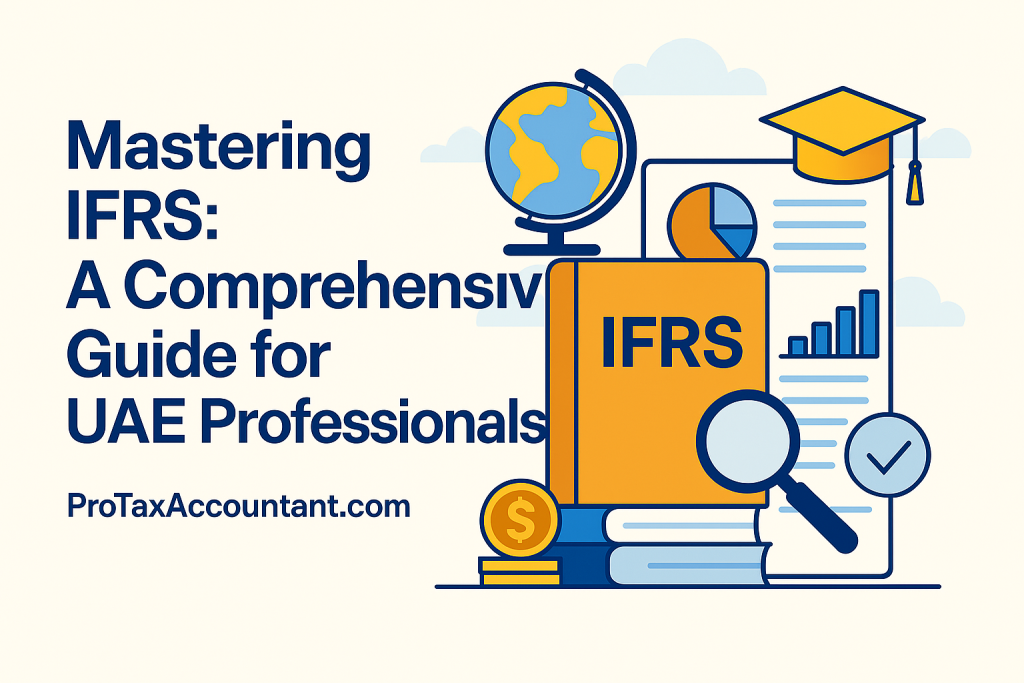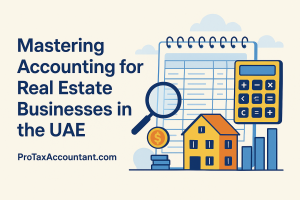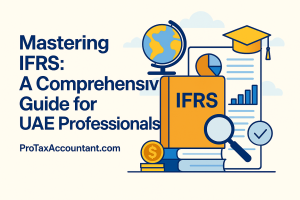In the UAE’s rapidly maturing financial environment, understanding IFRS isn’t optional—it’s a survival skill. Whether you're preparing for a VAT audit, onboarding investors, or calculating taxable income under the new Corporate Tax law, IFRS is the bedrock.
This guide provides a practical overview of IFRS, its direct impact on UAE businesses, common challenges, and how to leverage these standards for financial clarity and compliance.
1. IFRS in the UAE: Why it Matters for Your Business
The UAE's commitment to global financial transparency is underscored by the Ministry of Finance's (MoF) adoption of International Financial Reporting Standards (IFRS). This move aligns the nation's financial reporting with international best practices, moving away from local Generally Accepted Accounting Principles (GAAP).
Why IFRS Matters to UAE Professionals:
- Compliance Risk: Non-compliance can lead to significant audit qualifications and penalties.
- Audit Requirements: Most companies in the UAE are required to undergo an annual audit based on IFRS. Understanding IFRS is crucial for a smooth audit process. For insights into choosing the right partner, see Dubai's Top 30 Audit Firms.
- Corporate Tax Implications: The new UAE Corporate Tax law leverages IFRS-based financial statements as the starting point for taxable income calculation. This direct link makes IFRS proficiency indispensable. Explore our UAE Corporate Tax blog for more.
- Investor Confidence: IFRS-compliant financials enhance transparency, attracting foreign direct investment and fostering trust among stakeholders.
- Impact Across Entities: IFRS impacts all types of entities, from Free Zone companies and multinationals to local family businesses, ensuring a consistent financial language across the board. Learn more about designated free zones in UAE.
2. IFRS in Action: Practical UAE Case Studies
Understanding IFRS is best achieved through practical application. Here's how key IFRS standards impact specific UAE business scenarios.
IFRS Standard → UAE Business Impact:
| IFRS Standard | UAE Business Impact | Relevant Business Type |
|---|---|---|
| IFRS 16: Leases | Mandates lessees to recognize most leases on the balance sheet as a 'Right-of-Use' asset and a lease liability. This impacts financial ratios and borrowing capacity. | Dubai-based logistics firms, retail chains with leased properties, any business with significant operating leases. For insights into real estate accounting, this is crucial. |
| IFRS 15: Revenue from Contracts with Customers | Requires a five-step model for revenue recognition, often changing when revenue is recognized for long-term projects or contracts with multiple deliverables. | Real estate developers (especially for off-plan sales), construction companies, IT service providers in free zones. |
| IFRS 9: Financial Instruments | Impacts the classification, measurement, and impairment of financial assets and liabilities. Crucial for managing credit risk and hedging. | Local fintech companies, banks, investment firms, any business dealing with complex financial instruments or significant receivables. For more on this, consider cryptocurrency accounting regulation in UAE. |
| IAS 21: The Effects of Changes in Foreign Exchange Rates | Guides how to account for foreign currency transactions and operations, including translation of foreign operations' financial statements. | Multinational corporations, import/export businesses, companies with foreign currency loans or investments. |
3. IFRS and UAE Corporate Tax: A Critical Connection
The introduction of Corporate Tax in the UAE has forged a direct link between your IFRS-based financial statements and your tax obligations.
How IFRS Ties Directly to Corporate Tax:
- Taxable Income Calculation: Your accounting profit (or loss) as per IFRS is the starting point for calculating taxable income under the Corporate Tax Law. Adjustments are then made for non-deductible expenses and exempt income. Learn more about calculating UAE taxable income.
- Transfer Pricing: The Arm's Length Principle, a key aspect of Corporate Tax, requires intercompany transactions to be priced as if they occurred between independent parties. IFRS-based financial reporting helps in establishing these fair values.
- Group Consolidations for Tax Groups: For businesses forming a Corporate Tax group, consolidated financial statements prepared under IFRS are essential for group tax purposes.
Example: Your IFRS-based financials will directly impact your taxable profits. Overstating expenses due to incorrect lease capitalization (IFRS 16) or premature revenue recognition (IFRS 15) could lead to discrepancies that get flagged during tax audits. Conversely, understanding mastering deductible expenses for UAE Corporate Tax and non-deductible expenses is crucial. For quick calculations, use our UAE Corporate Tax calculator.
4. Essential IFRS Tools & Checklists for UAE Professionals
To help UAE professionals navigate IFRS, here are some practical tools and checklists.
Quick IFRS Checklist for UAE SMEs:
Click to expand: Key IFRS Considerations for SMEs
- ✅ Are your financial statements prepared on an accrual basis (as mandated by IFRS), not cash? See Cash vs. Accrual Accounting in UAE.
- ✅ Have you properly accounted for all leases under IFRS 16?
- ✅ Is your revenue recognition compliant with IFRS 15's five-step model?
- ✅ Are all financial instruments (loans, receivables) correctly classified and measured under IFRS 9?
- ✅ Do you have a clear policy for foreign currency transactions and translation?
- ✅ Is your fixed asset register complete and are depreciation policies consistent?
- ✅ Are all related party transactions disclosed as per IAS 24?
IFRS vs. UAE Corporate Tax Reporting Differences:
While IFRS is the starting point, the Corporate Tax Law introduces specific adjustments. For example, some expenses deductible under IFRS might be non-deductible for Corporate Tax purposes. This includes certain non-deductible expenses related to exempt income. Understanding tax loss carryforwards is also vital.
IFRS Compliance Calendar (Year-End Checklist Overview):
A structured approach to year-end closing ensures IFRS compliance. This involves timely reconciliations, accruals, and provisions. For more on this, refer to our guide on month-end closing.
5. Visualizing IFRS: Key Concepts & Timelines
Visual aids can simplify complex IFRS concepts and reporting timelines.
Visual Comparison: Old GAAP vs. IFRS (Conceptual)
Historically, local GAAP (Generally Accepted Accounting Principles) in the UAE had more flexibility and less detailed disclosure requirements. IFRS, in contrast, emphasizes principles-based accounting, requiring more judgment and extensive disclosures. Key differences often lie in areas like revenue recognition, lease accounting, and financial instrument valuation, leading to potentially different financial statement outcomes.
Timeline Graphic: IFRS Reporting Schedule in UAE (Conceptual)
This timeline visually represents the typical annual reporting cycle for an IFRS-compliant entity in the UAE, from year-end to audit completion and tax filing deadlines.
6. Common IFRS Mistakes in the UAE & How to Avoid Them
Even experienced professionals can stumble on specific IFRS applications in the UAE context. Here are 5 common mistakes and how to avoid them.
5 IFRS Mistakes UAE Businesses Make (and How to Avoid Them):
- Misclassifying Advances under IFRS 15: Many businesses receive advance payments for goods or services. Incorrectly recognizing these as immediate revenue instead of deferred revenue (liability) can distort financial statements. Ensure you apply the five-step model of IFRS 15 correctly.
- Ignoring FX Revaluation under IAS 21: For businesses dealing with multiple currencies, failing to properly revalue foreign currency monetary items at each reporting date can lead to inaccurate financial positions. Ensure consistent application of exchange rates.
- Using Cash Accounting when IFRS Mandates Accrual: While some small businesses might use cash accounting for internal purposes, IFRS strictly mandates the accrual basis. This means recognizing revenues when earned and expenses when incurred, regardless of cash movement. Understand cash vs. accrual accounting in the UAE.
- Inadequate Disclosure of Related Party Transactions: IAS 24 requires comprehensive disclosure of related party relationships and transactions. Many family-owned businesses or groups in the UAE overlook the full extent of these disclosures.
- Incorrect Lease Accounting (IFRS 16): Before IFRS 16, many leases were off-balance sheet. Now, most leases must be capitalized, recognizing a Right-of-Use asset and a lease liability. Failing to do so can significantly misrepresent a company's financial position and leverage.
These are just a few of the 20 most confused finance topics that business owners must know.
7. Tailored IFRS Insights for Key Professionals
IFRS impacts various roles within a business differently. Here's tailored advice for key professionals.
For CFOs: What You Need to Know Before Your Next Audit
Your primary focus should be on ensuring the integrity of your financial reporting system. This means robust internal controls, a clear audit trail, and proactive communication with your auditors. Anticipate key IFRS areas that impact your industry and ensure your team is prepared with supporting documentation. Reviewing KPIs like EBITDA and advanced financial ratios derived from IFRS financials is also key. For audit preparation, see Dubai's Top 30 Audit Firms.
For Accountants: Your IFRS 15 Cheat Sheet
IFRS 15 can be complex, especially for businesses with diverse revenue streams. Remember the five steps: 1) Identify the contract; 2) Identify performance obligations; 3) Determine the transaction price; 4) Allocate the transaction price; 5) Recognize revenue when (or as) performance obligations are satisfied. Pay close attention to variable consideration, contract modifications, and principal vs. agent considerations. A strong understanding of the general ledger is fundamental.
For Consultants: Helping Clients Interpret IFRS in Family-Owned Groups
Family-owned businesses often have unique structures and related party transactions. When advising on IFRS, focus on transparent disclosures under IAS 24. Help them understand the impact of IFRS on their financial covenants, dividend policies, and succession planning. Highlighting the benefits of accounting outsourcing in Dubai can also be valuable for these clients.
8. Monthly & Annual IFRS Reporting: Key Considerations
To help UAE professionals navigate IFRS, here are some practical tools and checklists.
Quick IFRS Checklist for UAE SMEs:
Click to expand: Key IFRS Considerations for SMEs
- ✅ Are your financial statements prepared on an accrual basis (as mandated by IFRS), not cash? See Cash vs. Accrual Accounting in UAE.
- ✅ Have you properly accounted for all leases under IFRS 16?
- ✅ Is your revenue recognition compliant with IFRS 15's five-step model?
- ✅ Are all financial instruments (loans, receivables) correctly classified and measured under IFRS 9?
- ✅ Do you have a clear policy for foreign currency transactions and translation?
- ✅ Is your fixed asset register complete and are depreciation policies consistent?
- ✅ Are all related party transactions disclosed as per IAS 24?
IFRS vs. UAE Corporate Tax Reporting Differences:
While IFRS is the starting point, the Corporate Tax Law introduces specific adjustments. For example, some expenses deductible under IFRS might be non-deductible for Corporate Tax purposes. This includes certain non-deductible expenses related to exempt income. Understanding tax loss carryforwards is also vital.
IFRS Compliance Calendar (Year-End Checklist Overview):
A structured approach to year-end closing ensures IFRS compliance. This involves timely reconciliations, accruals, and provisions. For more on this, refer to our guide on month-end closing.
9. Data Management & Recordkeeping for IFRS Compliance
In the digital age, effective data management and meticulous documentation are paramount for IFRS compliance and overall financial health.
Cloud vs. On-Premise Strategies:
- Cloud-Based: Offers accessibility from anywhere, scalability, automated backups, and often lower upfront costs. Ideal for modern businesses seeking flexibility. Explore the benefits of cloud bookkeeping solutions in the UAE.
- On-Premise: Provides greater control over data and customization but requires significant IT infrastructure and maintenance. Less common for new setups.
Security Checklist:
- 🔒 Implement strong password policies and multi-factor authentication (MFA).
- ☁️ Utilize secure cloud storage solutions with data encryption (e.g., Google Drive, OneDrive, Dropbox Business).
- 💾 Establish automated daily or weekly backup routines for all critical financial data.
- 🔑 Implement strict access controls, ensuring only authorized personnel can view or modify sensitive documents.
- 🔄 Maintain document version control to track changes and revert to previous versions if needed.
- 📜 Adhere to UAE's data retention laws (e.g., 5 years for tax records).
10. IFRS Impact on Capital Expenditure (CAPEX) in UAE
While this article focuses on IFRS broadly, its principles are deeply embedded in sector-specific accounting. For a deeper dive into real estate accounting, refer to our comprehensive guide on Real Estate Accounting in UAE.
Case Study Snippet: Impact of IFRS on Capital Expenditure (CAPEX)
Scenario: A manufacturing company in Jebel Ali Free Zone undertakes a major factory upgrade. Under IFRS, the costs must be carefully assessed for capitalization (adding to asset value) versus expensing (treating as an immediate cost). Incorrectly expensing a significant upgrade that extends asset life would understate assets and overstate expenses, impacting profitability and taxable income. This directly relates to understanding Capital Expenditure (CAPEX) in UAE and monitoring CAPEX KPIs.
11. Frequently Asked Questions (FAQs) on IFRS in UAE
Why is IFRS important for businesses in the UAE?
IFRS is important in the UAE because it is mandated by the Ministry of Finance, ensuring global comparability and transparency in financial reporting. It impacts audit requirements, attracts foreign investment, and directly influences Corporate Tax calculations, making it crucial for compliance and strategic decision-making.
How does IFRS 16 (Leases) affect UAE companies?
IFRS 16 requires most leases to be recognized on the balance sheet as a 'Right-of-Use' asset and a corresponding lease liability. This changes how companies report their assets, liabilities, and financial ratios, particularly impacting businesses with significant leased assets like logistics, retail, and real estate firms in the UAE.
What is the connection between IFRS and UAE Corporate Tax?
IFRS-based financial statements serve as the starting point for calculating taxable income under the new UAE Corporate Tax Law. Adjustments are then made for non-deductible expenses and exempt income. Accurate IFRS reporting is therefore fundamental for correct Corporate Tax compliance.
Are Free Zone companies in the UAE required to follow IFRS?
Yes, generally, Free Zone companies in the UAE are also required to prepare their financial statements in accordance with IFRS. This ensures consistency across all business entities in the UAE, regardless of their operational zone.
What are common IFRS mistakes made by UAE businesses?
Common mistakes include misclassifying advance payments (IFRS 15), failing to properly revalue foreign currency items (IAS 21), using cash accounting instead of accrual, inadequate disclosure of related party transactions (IAS 24), and incorrect capitalization of leases under IFRS 16.
How does IFRS 15 (Revenue from Contracts with Customers) impact real estate developers in the UAE?
IFRS 15 significantly impacts real estate developers, especially for off-plan property sales. It requires revenue to be recognized when (or as) performance obligations are satisfied, often tied to construction milestones rather than just cash collection. This can lead to a different timing of revenue recognition compared to previous practices.
What is the role of IFRS 9 (Financial Instruments) for fintech companies in the UAE?
IFRS 9 is critical for fintech companies as it dictates how financial assets (like loans or investments) and liabilities are classified, measured, and impaired. It introduces new models for expected credit losses, impacting how fintechs provision for potential defaults on their lending portfolios or other financial exposures.
Do family businesses in the UAE need to comply strictly with IFRS?
Yes, family businesses in the UAE, like all other entities, are generally required to comply with IFRS for their financial reporting. A key area for them is IAS 24, which requires comprehensive disclosure of related party relationships and transactions, given the common interconnections within family-owned groups.
What are the benefits of IFRS compliance for UAE companies seeking investment?
IFRS compliance enhances the credibility and transparency of financial statements, making them more understandable and comparable for international investors. This increased transparency builds confidence, reduces perceived risk, and can significantly improve a UAE company's ability to attract foreign direct investment and secure financing.
Where can I find official IFRS guidance for the UAE?
Official IFRS standards are issued by the IFRS Foundation (www.ifrs.org). For UAE-specific interpretations or local regulations that interact with IFRS, refer to the Federal Tax Authority (FTA) (tax.gov.ae) and the Ministry of Finance (MoF) (mof.gov.ae) websites.





